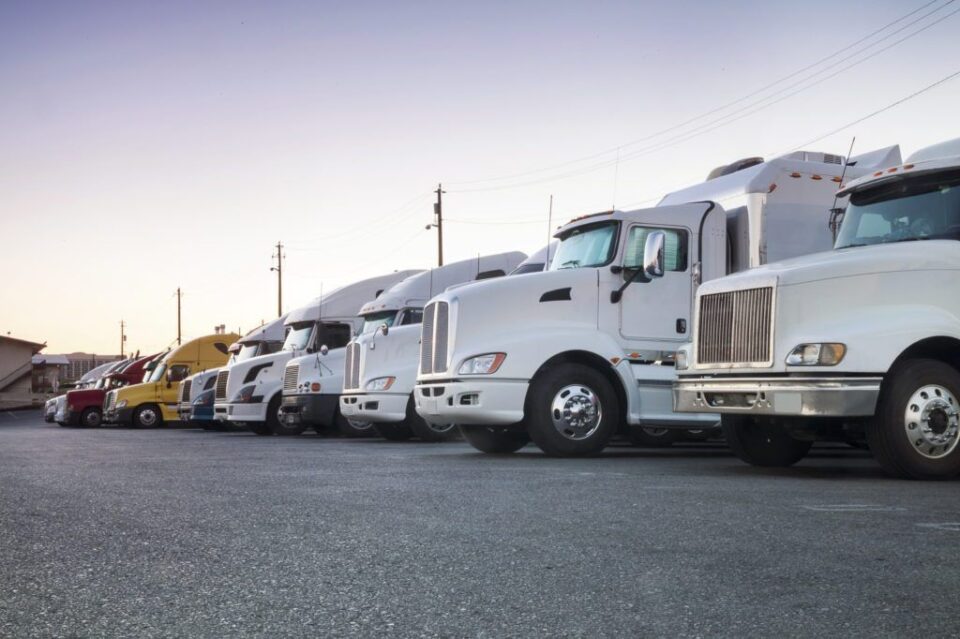The Federal Motor Carrier Safety Administration (FMCSA), a branch of the US Department of Transportation, oversees the safety regulations for commercial motor vehicles (CMVs). CMVs include vehicles with a gross vehicle weight rating (GVWR) exceeding 10,001 pounds or those designed for paid transportation of goods or passengers. In this article, we will discuss how CMV operators can stay compliant with FMCSA regulations.
Why is it important to be FMCSA compliant?

- Being FMCSA compliant can help commercial motor vehicle operators avoid facing significant fines and penalties, including having their operating authority revoked.
- FMCSA regulations are designed to minimize the risk of accidents and injuries.
- Customers are more likely to do business with companies they know are committed to safety, and being FMCSA compliant can help improve your company’s reputation in that regard.
How to stay compliant with FMCSA
1. Know the FMCSA regulations

The FMCSA has a comprehensive set of regulations that cover all aspects of CMV safety, from driver qualifications to vehicle maintenance. It is important to familiarize yourself with the regulations that apply to your specific operation. You can find the FMCSA regulations on their official website.
2. Implement a compliance program
A compliance program is a set of policies and procedures that help you ensure that your operation meets all FMCSA regulations. Once you know and understand the FMCSA rules, you should create a compliance program for your company. This program should include the following:
- Driver qualification procedures: Ensure that all your drivers are qualified to operate a CMV by checking their driving records.
- Vehicle maintenance program: Establish a regular vehicle maintenance schedule and keep records of all maintenance performed. Also, ensure that all your vehicles are properly marked with their DOT registration number.
- Hours of service (HOS) compliance: Monitor your drivers’ HOS records to ensure they do not exceed the maximum driving hours or on-duty hours allowed by FMCSA regulations.
- Drug and alcohol testing: Conduct random and reasonable suspicion drug and alcohol testing of your drivers.
- Training: Train your drivers on FMCSA regulations and other safety topics.
3. Use technology to your advantage
There are many software solutions available that can help you to stay compliant with FMCSA regulations. These solutions can automate many tasks involved in FMCSA compliance, such as driver qualification checks, HOS monitoring, and drug/alcohol testing.
4. Continuously monitor your compliance
Regularly monitor your compliance with FMCSA regulations. This can be done by conducting internal audits, reviewing your records, and talking to your drivers. If you find any areas where you are not in compliance, take corrective action immediately.
5. Stay up-to-date on the latest FMCSA regulations
It is important to stay up-to-date on the latest changes to ensure your operation is always compliant. You can sign up for FMCSA email alerts to be notified of any regulation changes.
Penalties for FMCSA Non-Compliance

In the United States, the Federal Motor Carrier Safety Administration (FMCSA) enforces regulations to ensure the safety and compliance of commercial motor carriers. Non-compliance with FMCSA rules can lead to serious consequences for carriers and drivers. In this article, we’ll explore the penalties associated with FMCSA non-compliance.
Understanding FMCSA Non-Compliance
FMCSA non-compliance occurs when commercial motor carriers and their drivers fail to adhere to the safety regulations and standards set forth by the FMCSA. These regulations are in place to protect both drivers and the general public.
Penalties for Non-Compliance
1. Fines and Civil Penalties
– Fines can range from hundreds to thousands of dollars depending on the severity of the violation.
– Civil penalties can be imposed on both carriers and individual drivers for violations such as hours-of-service (HOS) violations, inadequate vehicle maintenance, or failure to maintain proper records.
2. Out-of-Service Orders
– Serious violations can result in an out-of-service order, which means a carrier or driver cannot operate until the issues are resolved.
– Operating under an out-of-service order can result in additional fines and penalties if caught.
3. Loss of Commercial Driver’s License (CDL)

– Drivers who repeatedly violate FMCSA regulations risk losing their CDL, which can effectively end their career in the commercial transportation industry.
4. Increased Insurance Costs
– Non-compliance can lead to higher insurance premiums for both carriers and drivers, making it more costly to operate within the industry.
5. Negative Impact on Safety Ratings
– FMCSA maintains a safety rating system, and non-compliance can lead to a downgrade in a carrier’s safety rating.
– A lower safety rating can result in decreased business opportunities and increased scrutiny from law enforcement.
6. Criminal Penalties
– In cases of severe non-compliance, such as reckless driving or operating a commercial vehicle under the influence of drugs or alcohol, criminal charges may be filed, potentially leading to fines and imprisonment.
Steps to Avoid Non-Compliance
To avoid these penalties, carriers and drivers should:
– Stay informed about FMCSA regulations and updates.
– Maintain accurate records of HOS, vehicle inspections, and maintenance.
– Conduct regular vehicle inspections to ensure compliance with safety standards.
– Invest in driver training and safety programs.
– Implement drug and alcohol testing policies.
– Address any compliance issues promptly to prevent escalation.
Conclusion

FMCSA compliance is important for all CMV operators, regardless of size or type of operation. By staying compliant with FMCSA rules and regulations, you can ensure the safety of your drivers, passengers, and other motorists on the road.
Non-compliance with FMCSA regulations in the USA can result in fines, out-of-service orders, loss of CDL, increased insurance costs, negative safety ratings, and even criminal penalties. Carriers and drivers should prioritize compliance to ensure the safety of all road users and avoid the severe consequences associated with non-compliance. Staying informed and proactive in maintaining compliance is crucial in the commercial transportation industry.

